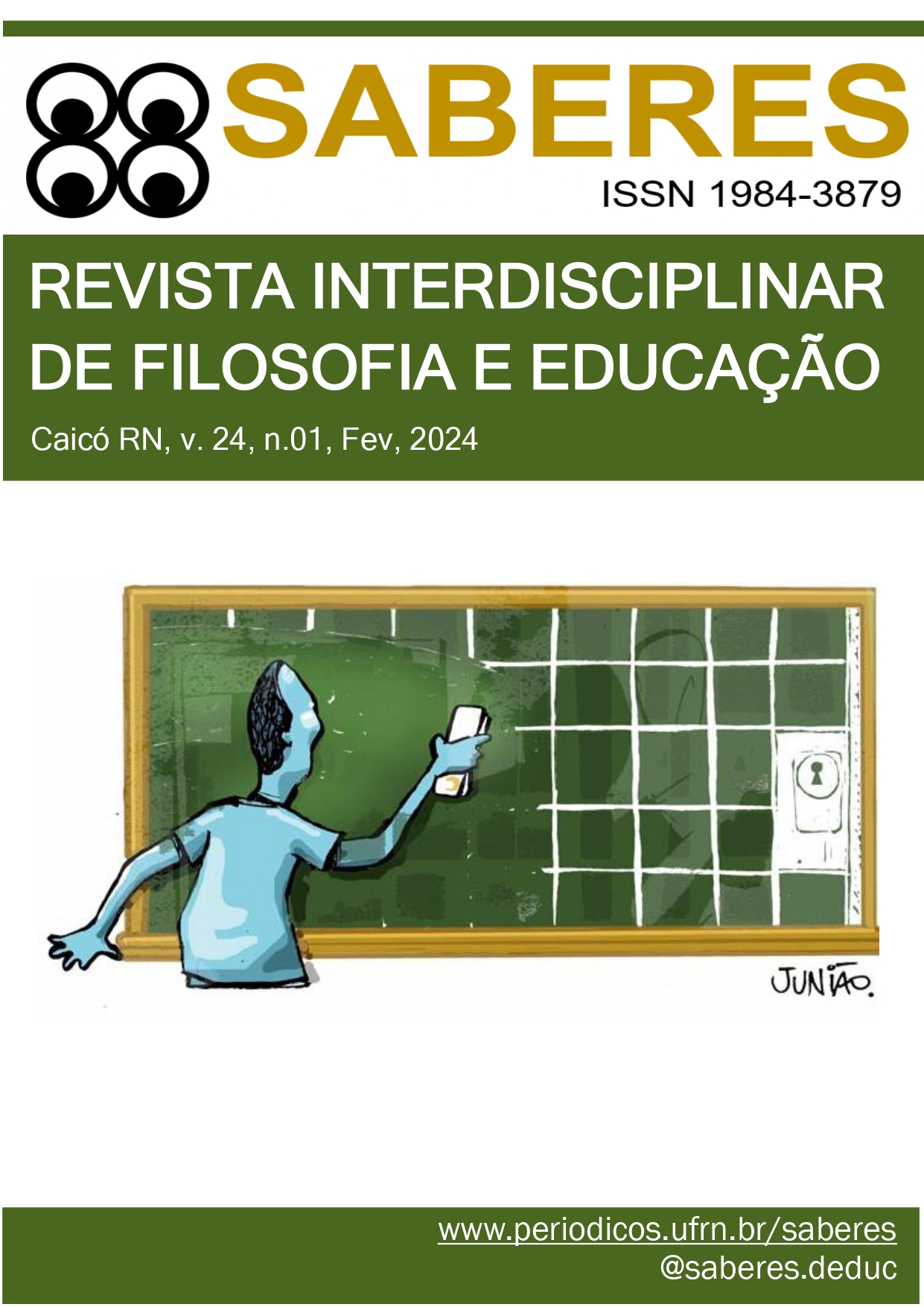ELEMENTOS DA COMPLEXIDADE NA PRÁTICA DOCENTE DE LÍNGUA PORTUGUESA DO INTERIOR CEARENSE A PARTIR DA PANDEMIA DO COVID-19
DOI:
https://doi.org/10.21680/1984-3879.2024v24n1ID36851Palavras-chave:
complexidade, ensino remoto, ensino de língua portuguesaResumo
O paradigma da complexidade ou paradigma emergente, representa, contemporaneamente, uma tendência mundial, sobretudo na história das ciências, a tomar todo e qualquer conhecimento humano em seu caráter sistêmico e múltiplo, já que, a fragmentação do conhecimento nem sempre consegue contemplar aspectos importantes na análise de um fenômeno. Durante a pandemia do COVID-19, o mundo passou por um período de caos, sendo o ensino, em suas várias modalidades, um dos principais impactados por esse momento histórico. A partir da vivência docente no interior do Estado do Ceará, o presente artigo tem como objetivo investigar a presença de elementos do Paradigma Complexo no ensino de língua portuguesa, partindo do período emergencial remoto de 2020/2021, ponderando as perspectivas de professores de Português do Ensino Médio da 17ª Coordenadoria Regional de Desenvolvimento da Educação do Estado do Ceará (CREDE 17), interior Cearense, sobre sua prática docente. Para isso, dialoga-se com estudos do Paradigma da Complexidade (Morin, 2015), da Educação (Morin, 2011; 2021) e do Pensamento Sistêmico (Vasconcellos, 2002). O procedimento metodológico adotado é o estudo de caso. O corpus é formado por entrevistas com seis professores de municípios que compõem a CREDE 17. Como resultado, aponta-se, principalmente a partir do período pandêmico, que os professores colaboradores lançaram mão de diversos elementos da Complexidade em sua prática docente, a qual é encarada como um sistema de natureza múltipla, envolvendo a subjetividade dos sujeitos, além da assumpção de uma postura aberta, com ações recursivas, autônomas, estratégicas, contextualizadas, presumindo imprevisibilidades e desordens.
Downloads
Referências
ANTUNES, I. Aula de português: Encontro e interação. São Paulo: Parábola Editorial, 2003.
BACHELARD, G. A formação do espírito científico: contribuição para uma psicanálise do conhecimento. Rio de Janeiro: Contraponto, 1996.
CRESWELL, J. W. Qualitative inquiry & research design: Choosing among five approaches (2 ed.). Thousand Oaks, London: Sage, 2007.
DENZIN, N. K.; LINCOLN, Y. S. O Planejamento da Pesquisa Qualitativa: Teorias e Abordagens. Porto Alegre: Artmed, 2006.
FREIRE, M. M.; LEFFA, V. A auto-ecoheteroformação tecnológica. In: MOITA LOPES, L.P. Linguística aplicada na modernidade recente: Festschrit para Antonieta Celani. São Paulo: Parábola, 2013.
GIL, A. C. Como elaborar projetos de pesquisa. São Paulo: Atlas, 2002.
HISTÓRICO DAS 21 CREDES DO CEARÁ. CREDE 16. Disponível em: https://www.crede16.seduc.ce.gov.br/institucional/historico/. Acesso em 24 jul. 2023.
JUNIOR, V. G. P.; JUNIOR, A.P.; E. ILARIO. Auto-organização, complexidade e formação da consciência bioética. Revista bioethikos. Centro Universitário São Camilo - 2014;8(1):75-79. Disponível em: https://saocamilo-sp.br/assets/artigo/bioethikos/155560/a6.pdf. Acesso em 08 jan. 2023.
LÜDKE, M.; ANDRÉ, M. Pesquisa em educação: abordagens qualitativas. 2. ed. Rio de Janeiro: E.P.U., 2015.
MARQUES, H.G.; MOURA, I.G.L.; GRIGORIO, M.I.S.; LIMA, V.S.; NETO, J.A.G. O papel do professor e do aluno no ensino híbrido na perspectiva da sala de aula invertida. Revista educação & ensino, Fortaleza, v. 6, n. 1, jan./jun. 2022. p. 75-102. Disponível em: https://periodicos.uniateneu.edu.br/index.php/revista-educacao-e-ensino/article/view/346 . Acesso em 03 maio 2024.
MENDONÇA, Márcia; ANDREATTA, Elaine; SCHLUDE, Victor. Apresentação. In: MENDONÇA, Márcia; ANDREATTA, Elaine; SCHLUDE, Victor (org.). Docência pandêmica: práticas de professores de língua(s) no ensino emergencial remoto. São Carlos: Pedro & João Editores, 2021. p. 08-18.
MORIN, E. Os sete saberes necessários à educação do futuro. São Paulo: Cortez, 2011.
MORIN, E. Introdução ao pensamento complexo. Porto Alegre: Sulina, 2015.
MORIN, E. A cabeça bem-feita: repensar a reforma, reformar o pensamento. 27ª edição. Rio de Janeiro: Bertrand Brasil, 2021.
ROJO, Rojane. Escola conectada: os multiletramentos e as TICS. São Paulo: Parábola, 2013.
TÁVORA, A. D. F. Teorias do Caos e Sistemas Adaptativos Complexos em Linguística Aplicada: o Fluxo de Produção de Conhecimento a Partir das Condições iniciais Inauguradas por Vera Menezes de Oliveira e Paiva. Relatório de Estágio pós doutoral. POSLIN – UFMG. 2022. Disponível em: https://drive.google.com/file/d/1QUEQCkoVXiXJySbVk-9HQE07uX3ke7oj/view. acesso em 18 set. 2023.
VASCONCELLOS, M.J.E. de. Pensamento sistêmico: o novo paradigma da ciência. Campinas: Papirus, 2002.
YIN, R. K. Estudo de Caso: Planejamento e Métodos. 3 ed. Porto Alegre: Bookman, 2005.
Downloads
Publicado
Como Citar
Edição
Seção
Licença
Copyright (c) 2024 Joice Élida Alves Gonçalves, Edmilson Luiz Rafael

Este trabalho está licenciado sob uma licença Creative Commons Attribution-NonCommercial-ShareAlike 4.0 International License.
Este obra está licenciado com uma Licença Creative Commons Atribuição 4.0 Internacional.
Autores que publicam nesta revista concordam com os seguintes termos:
a. Autores mantém os direitos autorais e concedem à revista o direito de primeira publicação, com o trabalho simultaneamente licenciado sob a Licença Creative Commons Attribution 4.0 que permite o compartilhamento do trabalho com reconhecimento da autoria e publicação inicial nesta revista.
b. Autores têm autorização para assumir contratos adicionais separadamente, para distribuição não-exclusiva da versão do trabalho publicada nesta revista (ex.: publicar em repositório institucional ou como capítulo de livro), com reconhecimento de autoria e publicação inicial nesta revista.
c. Autores têm permissão para publicar e distribuir seu trabalho online (ex.: em repositórios institucionais ou na sua página pessoal) após a publicação inicial nesta revista, já que isso pode gerar alterações produtivas, bem como aumentar o impacto e a citação do trabalho publicado (Veja O Efeito do Acesso Livre).
Foram feitos todos os esforços para identificar e creditar os detentores de direitos sobre as imagens publicadas. Se tem direitos sobre alguma destas imagens e não foi corretamente identificado, por favor, entre em contato com a revista Saberes e publicaremos a correção num dos próximos números.


 English
English Español (España)
Español (España) Português (Brasil)
Português (Brasil)



